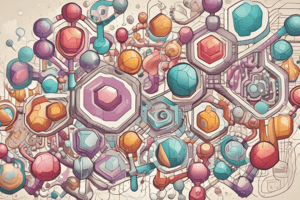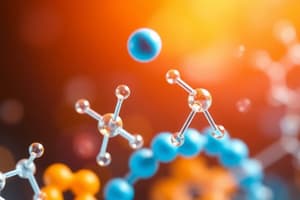Podcast
Questions and Answers
What is the primary function of hydrogen bonds in secondary structure formation?
What is the primary function of hydrogen bonds in secondary structure formation?
- To create a random coil conformation
- To share H-atoms between oxygen and nitrogen of different peptide bonds (correct)
- To break down the polypeptide chain
- To form covalent bonds between peptide bonds
What type of bonds are disulfide bridges?
What type of bonds are disulfide bridges?
- Non-covalent bonds
- Electrostatic interactions
- Hydrogen bonds
- Covalent bonds (correct)
What is the characteristic of a right-handed α-helix structure?
What is the characteristic of a right-handed α-helix structure?
- Parallel β-pleated sheet structure
- Left-handed orientation
- Intra-chain hydrogen bonds (correct)
- Inter-chain hydrogen bonds
What is the main stabilization factor of tertiary structure in proteins?
What is the main stabilization factor of tertiary structure in proteins?
What type of β-pleated sheet structure is formed when adjacent polypeptide chains run in opposite directions?
What type of β-pleated sheet structure is formed when adjacent polypeptide chains run in opposite directions?
What is the main function of β-turn or β-bends in proteins?
What is the main function of β-turn or β-bends in proteins?
What is the term for proteins containing two or more polypeptide chains?
What is the term for proteins containing two or more polypeptide chains?
What is the function of disulfide isomerase in protein folding?
What is the function of disulfide isomerase in protein folding?
What is the typical number of amino acids that make up a β-turn?
What is the typical number of amino acids that make up a β-turn?
What is the role of chaperons in protein folding?
What is the role of chaperons in protein folding?
What is the term for regions of proteins that are not organized as helices and pleated sheets?
What is the term for regions of proteins that are not organized as helices and pleated sheets?
What is the result of the joining of regions of α-helix and β-pleated sheet in some globular proteins?
What is the result of the joining of regions of α-helix and β-pleated sheet in some globular proteins?
What is the term for the sequence of residues in a protein?
What is the term for the sequence of residues in a protein?
What is the term for the complete folding pattern of a protein?
What is the term for the complete folding pattern of a protein?
What is the characteristic of hydrogen bonds in secondary structure?
What is the characteristic of hydrogen bonds in secondary structure?
What is the term for the interaction of subunits in a protein?
What is the term for the interaction of subunits in a protein?
What percentage of the total protein in mammals is collagen?
What percentage of the total protein in mammals is collagen?
Which of the following is NOT a force involved in quaternary structure?
Which of the following is NOT a force involved in quaternary structure?
What happens to a protein when it is denatured?
What happens to a protein when it is denatured?
What is a common cause of denaturation of proteins?
What is a common cause of denaturation of proteins?
What is the characteristic feature of fibrous proteins?
What is the characteristic feature of fibrous proteins?
What is the function of collagen in the body?
What is the function of collagen in the body?
What is the pKa value of NH3?
What is the pKa value of NH3?
What is the function of cis-trans prolyl isomerase in protein folding?
What is the function of cis-trans prolyl isomerase in protein folding?
What is the pKa value of COOH?
What is the pKa value of COOH?
Which of the following amino acids is semi-essential?
Which of the following amino acids is semi-essential?
What is the number of enzymes required for the synthesis of arginine?
What is the number of enzymes required for the synthesis of arginine?
What is the function of taurine?
What is the function of taurine?
Which of the following is not an essential amino acid?
Which of the following is not an essential amino acid?
What is the characteristic feature of collagen?
What is the characteristic feature of collagen?
Which of the following amino acids is involved in the urea cycle?
Which of the following amino acids is involved in the urea cycle?
What is the characteristic of the collagen triple helix?
What is the characteristic of the collagen triple helix?
What percentage of collagen is composed of proline and hydroxyproline?
What percentage of collagen is composed of proline and hydroxyproline?
What percentage of collagen is composed of glycine?
What percentage of collagen is composed of glycine?
What type of bonds are formed between hydroxylysine residues in collagen?
What type of bonds are formed between hydroxylysine residues in collagen?
What is the repeating pattern of amino acids in collagen?
What is the repeating pattern of amino acids in collagen?
What is the function of collagenases?
What is the function of collagenases?
What is the function of γ-aminobutyric acid?
What is the function of γ-aminobutyric acid?
What is the primary structure of a collagen polypeptide chain?
What is the primary structure of a collagen polypeptide chain?
What type of interactions stabilize the conformation of collagen?
What type of interactions stabilize the conformation of collagen?
What is the main goal of protein analysis in molecular medicine?
What is the main goal of protein analysis in molecular medicine?
Which of the following techniques is used to determine the primary structure of a protein?
Which of the following techniques is used to determine the primary structure of a protein?
What is the purpose of highly purified protein?
What is the purpose of highly purified protein?
Which of the following is a method used in protein sequencing?
Which of the following is a method used in protein sequencing?
What is the purpose of N-Terminal Analysis?
What is the purpose of N-Terminal Analysis?
What is Edman's Reagent used for in protein sequencing?
What is Edman's Reagent used for in protein sequencing?
Why is protein purification necessary?
Why is protein purification necessary?
What is the purpose of Carboxypeptidase Method in protein sequencing?
What is the purpose of Carboxypeptidase Method in protein sequencing?
What is the main difference between N-Terminal Analysis and C-Terminal Analysis?
What is the main difference between N-Terminal Analysis and C-Terminal Analysis?
What is the purpose of protein sequencing?
What is the purpose of protein sequencing?
What type of interactions occur between proteins and the stationary phase in ion exchange chromatography?
What type of interactions occur between proteins and the stationary phase in ion exchange chromatography?
What is the primary mechanism of protein purification in affinity chromatography?
What is the primary mechanism of protein purification in affinity chromatography?
What is the primary principle behind salt precipitation in protein purification?
What is the primary principle behind salt precipitation in protein purification?
What is the purpose of adding salts such as ammonium sulfate in protein purification?
What is the purpose of adding salts such as ammonium sulfate in protein purification?
What is the purpose of using urea, guanidine hydrochloride, or high salt concentrations in affinity chromatography?
What is the purpose of using urea, guanidine hydrochloride, or high salt concentrations in affinity chromatography?
What is the primary component of the stationary phase in paper chromatography?
What is the primary component of the stationary phase in paper chromatography?
What is the characteristic of proteins that adhere to beads with negatively charged functional groups in ion exchange chromatography?
What is the characteristic of proteins that adhere to beads with negatively charged functional groups in ion exchange chromatography?
What is the purpose of using SDS in polyacrylamide gel electrophoresis (PAGE)?
What is the purpose of using SDS in polyacrylamide gel electrophoresis (PAGE)?
What is the primary interaction between proteins and the stationary phase in column chromatography?
What is the primary interaction between proteins and the stationary phase in column chromatography?
What is the primary advantage of using high pressure chromatography (HPLC)?
What is the primary advantage of using high pressure chromatography (HPLC)?
What is the purpose of the mobile phase in chromatography?
What is the purpose of the mobile phase in chromatography?
What is the basis of separation in size exclusion chromatography?
What is the basis of separation in size exclusion chromatography?
What is the primary advantage of using multiple successive purification techniques in protein purification?
What is the primary advantage of using multiple successive purification techniques in protein purification?
What is the purpose of using different pH values in ion exchange chromatography?
What is the purpose of using different pH values in ion exchange chromatography?
What is the primary characteristic of proteins that are separated using salt precipitation?
What is the primary characteristic of proteins that are separated using salt precipitation?
What is the advantage of using affinity chromatography compared to other chromatography methods?
What is the advantage of using affinity chromatography compared to other chromatography methods?
What is the primary component of the stationary phase in thin-layer chromatography?
What is the primary component of the stationary phase in thin-layer chromatography?
What is the purpose of using immobilized substrates, products, or inhibitors in affinity chromatography?
What is the purpose of using immobilized substrates, products, or inhibitors in affinity chromatography?
What is the primary purpose of chromatographic techniques in protein purification?
What is the primary purpose of chromatographic techniques in protein purification?
What is the primary mechanism of salt precipitation in protein purification?
What is the primary mechanism of salt precipitation in protein purification?
Flashcards
Essential Amino Acids
Essential Amino Acids
Amino acids that cannot be synthesized by the human body and must be obtained from the diet.
Non-Essential Amino Acids
Non-Essential Amino Acids
Amino acids that can be synthesized by the human body.
Secondary Structure
Secondary Structure
Folding of short polypeptide segments into geometrically ordered units stabilized by hydrogen bonds.
Alpha Helix Structure
Alpha Helix Structure
Signup and view all the flashcards
Parallel β-Pleated Sheet
Parallel β-Pleated Sheet
Signup and view all the flashcards
Anti-Parallel β-Pleated Sheet
Anti-Parallel β-Pleated Sheet
Signup and view all the flashcards
Beta Turn (Reverse Turn)
Beta Turn (Reverse Turn)
Signup and view all the flashcards
Super Secondary Structure
Super Secondary Structure
Signup and view all the flashcards
Tertiary Structure
Tertiary Structure
Signup and view all the flashcards
Quaternary Structure
Quaternary Structure
Signup and view all the flashcards
Denaturation of Proteins
Denaturation of Proteins
Signup and view all the flashcards
Fibrous Proteins
Fibrous Proteins
Signup and view all the flashcards
Globular Proteins
Globular Proteins
Signup and view all the flashcards
Collagen
Collagen
Signup and view all the flashcards
SDS-PAGE
SDS-PAGE
Signup and view all the flashcards
Chromatographic Techniques
Chromatographic Techniques
Signup and view all the flashcards
Ion Exchange Chromatography
Ion Exchange Chromatography
Signup and view all the flashcards
Affinity Chromatography
Affinity Chromatography
Signup and view all the flashcards
Study Notes
Amino Acids
- There are 20 different amino acids that occur naturally in proteins.
- Essential amino acids cannot be synthesized by the human body and must be obtained from the diet.
- Non-essential amino acids can be synthesized by the human body.
- Examples of essential amino acids: methionine (M), arginine (A), tryptophan (T), threonine (T), valine (V), isoleucine (IL), leucine (L), phenylalanine (P), histidine (H), and lysine (L).
- Histidine and arginine are sometimes referred to as semi-essential because the body synthesizes them to some extent.
Biosynthesis of Amino Acids
- The biosynthesis of non-essential amino acids is different from that of essential amino acids.
Essential Amino Acids are Difficult to Synthesize
- The number of enzymes required for the synthesis of essential amino acids is higher than that of non-essential amino acids.
Rare and Unusual Amino Acids
- These amino acids are not found in proteins but play important roles in metabolism.
- Examples: ornithine, citrulline, arginino succinic acid, β-alanine, taurine, γ-aminobutyric acid, mono- and di-iodotyrosine, pantothenic acid, homoserine, and homocysteine.
Secondary Structure
- The folding of short segments of polypeptide into geometrically ordered units.
- Hydrogen bonds are weak, low-energy noncovalent bonds formed between oxygen of CO and nitrogen of -NH of different peptide bonds.
- Secondary structure can form either an α-helix or β-pleated sheet structure.
Alpha Helix Structure
- Right-handed α-helix has intra-chain hydrogen bonds.
Beta Sheet Structure
- Parallel β-pleated sheet is formed when adjacent polypeptide chains run in the same direction.
- Anti-parallel β-pleated sheet is formed when adjacent polypeptide chains run in opposite directions.
Random Coil (Disordered) Conformation
- Regions of proteins that are not organized as helices and pleated sheets are said to be present in random coil conformation.
Beta Turn (Reverse Turn)
- A hairpin turn of a polypeptide chain is called a β-turn.
- β-turn connects anti-parallel β-sheets and usually consists of four amino acids: Gly, Ser, Asp, and proline.
Super Secondary Structure
- In some globular proteins, regions of α-helix and β-pleated sheet join to form super secondary structure or motifs.
Tertiary Structure
- The three-dimensional folding of a polypeptide chain.
- Tertiary structure is mainly stabilized by non-covalent bonds.
Non-Covalent Bonds in Tertiary Structure
- Electrostatic interactions, hydrogen bonding, interactions of non-polar side chains, van der Waals interactions, and disulfide bridges (in some proteins) stabilize protein structure.
Quaternary Structure
- Proteins containing two or more polypeptide chains possess quaternary structure.
- These proteins are called oligomers, and the individual polypeptide chains are called protomers or subunits.
Forces in Quaternary Structure
- Hydrogen bonding, electrostatic interactions, hydrophobic interactions, van der Waals interactions, and disulfide bonds stabilize quaternary structure.
Protein Folding
- Protein folding enzymes: disulfide isomerase and cis-trans prolyl isomerase aid protein folding.
Protein Factors
- Chaperones (chaperonins) aid protein folding by preventing the formation of aggregates.
Denaturation of Proteins
- Denaturation is the loss of native conformation, and it alters physical, chemical, and biological properties of a protein.
Causes of Denaturation
- High temperature, extreme pH, use of urea and guanidine at high concentrations, UV radiation, sonication, vigorous shaking, detergent treatment, and exposure to heavy metals can cause denaturation.
Classification of Proteins on the Basis of Shape and Size
- Fibrous proteins have an axial ratio of length: width greater than 10.
- Globular proteins have an axial ratio of length: width less than 10.
Structural Protein: Collagen
- Collagen is the major protein comprising the extracellular matrix (ECM).
- Collagen is mainly synthesized by fibroblasts, muscle cells, and epithelial cells.
- There are about 28 different types of collagen.
Collagen Structure
- Collagen consists of 3 coiled subunits (3 polypeptide chains-α chains).
- Each chain consists of about 1000 amino acids twisted around each other in a characteristic right-handed triple helix.
- Every third amino acid residue of collagen is glycine (Gly).
Protein Analysis
- Protein structure can be analyzed using:
- X-ray crystallography
- Nuclear magnetic resonance (NMR)
- Spectroscopy
- Protein activity and amount can be analyzed using:
- UV spectroscopy
- Bradford protein assay
- Coomassie brilliant blue dye
Determination of Protein Primary Structure (Amino Acid Composition)
- Identification of proteins associated with specific physiologic states or diseases is an important goal of molecular medicine
- Primary sequence of a protein provides a molecular fingerprint for identification and information for cloning the gene or genes that encode it
Protein Sequencing
- N-Terminal analysis determines the amino terminal end of the polypeptide chain using:
- Sanger's method
- Edman's method
- C-Terminal analysis determines the carboxy terminal end of the polypeptide chain using:
- Carboxypeptidase method
- Edman's sequencing method involves:
- Chromatography
- Electrophoresis
- Spectroscopy
Protein Purification
- Highly purified protein is essential for determining its amino acid sequence and for use in biological, medical, and pharmaceutical processes
- Protein purification involves isolating a specific protein from a mixture of thousands of different proteins
- Classic approaches use differences in target protein properties, such as:
- Salt precipitation (salting out)
- Chromatographic techniques
Chromatographic Techniques
- Chromatographic separations partition molecules between two phases: mobile and stationary
- Stationary phase matrices interact with proteins based on their:
- Charge
- Hydrophobicity
- Ligand-binding properties
- Types of chromatography include:
- Ion exchange chromatography
- Size exclusion chromatography
- Affinity chromatography
- High pressure chromatography (HPLC)
Ion Exchange Chromatography
- Proteins interact with the stationary phase by charge-charge interactions
- Proteins with a net positive charge adhere to beads with negatively charged functional groups (cation exchangers)
- Proteins with a net negative charge adhere to beads with positively charged functional groups (anion exchangers)
Affinity Chromatography
- Affinity chromatography exploits the high selectivity of proteins for their ligands
- Proteins can be purified using immobilized substrates, products, coenzymes, or inhibitors
- Bound proteins are eluted by competition with soluble ligand or by disrupting protein-ligand interactions using:
- Urea
- Guanidine hydrochloride
- Mildly acidic pH
- High salt concentrations
SDS-PAGE
- SDS-PAGE is a technique used to separate proteins based on their molecular weight
- It involves polyacrylamide gel electrophoresis in the presence of the anionic detergent sodium dodecyl sulfate (SDS)
Studying That Suits You
Use AI to generate personalized quizzes and flashcards to suit your learning preferences.




